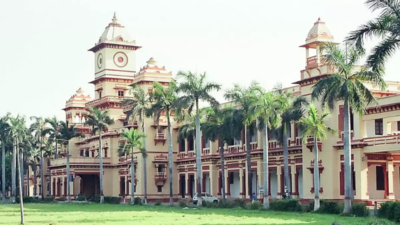- News
- City News
- varanasi News
- Two-day national seminar on 'Indigenous Cow, Organic Farming and Panchgavya Chikitsa' concludes at BHU
Trending
Two-day national seminar on 'Indigenous Cow, Organic Farming and Panchgavya Chikitsa' concludes at BHU
A two-day national seminar on 'Indigenous Cow, Organic Farming and Panchgavya Chikitsa' concluded at Banaras Hindu University. Experts discussed the importance of indigenous cows, cow rearing, and Panchgavya medicine. The event featured presentations on Ayurveda, gomutra's effects, and the need for research-backed evidence in Panchgavya medicine.

The purpose of the seminar was to discuss the importance of indigenous cow, cow rearing, and panchgavya medicine.

On the concluding day of the seminar, many keynote speakers addressed the session and presented their views on the preservation and propagation of Ayurveda and Panchgavya Chikitsa.
In his presentation, Dr. Sanjay Wate, Principal, Anurag College of Pharmacy, Bhandara, talked about the effects of gomutra on dermatitis problems. Dr. Wate further advocated for harmony between Ayurveda and Allopathy.
“We need to make a push towards Ayurveda and not just sit back and wait for people to come forward in its support; it’s herculean, but together we can make it,” he said.
Speaking on the occasion, Dr. Manish Deshmukh from Datta Meghe Institute of Medical Sciences, Wardha, introduced a website which is a repository for research on Panchgavya.
The website, NRPAC, has been created to provide a space to publish research papers. As scientists are working on Panchgavya but due to the unavailability of a place to aggregate all the published research papers in one place, they may be working on the same topic.
This website will address that problem as researchers can upload their papers here and let other fellows know the development in that particular area of research.
“When we began research on Panchgavya, we were mocked and referred to as gay-gobar wala scientists, but we kept ahead and many modern science practitioners joined us later,” he said, adding, “Gaay is our mata and Panchgavya is effective, but we need to back the Panchgavya medicine with evidence and research.”
Dr. Pushpahas M. Ballal, professor at Anurag College of Pharmacy, viewed that there should be an SOP (Standard Operating Procedure) in Ayurveda research as then only anyone will hesitate to challenge us on this issue. He was speaking in the backdrop of practitioners of modern medicine not prescribing Ayurvedic medicines.
Prof. Anand Chaudhary, Faculty of Ayurveda, BHU, talked about the qualities of different types of bhashma mentioned in Ayurveda and stressed on the daily routine that should be followed for a healthy lifestyle. He further said, “We are striving for a Nobel prize in Ayurveda and if research is continued in this field at this pace, then we may get a Nobel by 2047.”
Prof. Gopal Nath from the Department of Microbiology, BHU, also emphasised the research aspect of Panchgavya Chikitsa and said, “Just because someone said or wrote somewhere about the benefits of Ayurveda, we shouldn’t accept it, we need to research.”
He also talked about water harvesting and said that water harvesting is required to be done around the river Ganga to maintain its flow.
Sunil Mansinghka of Gauvigyan Anusandhan Kendra, Devlapar, who was also hosting the second day of the seminar, reiterated his claim that gomutra has cured even stage-4 cancer. Prof. O. P. Singh of the Department of Kayachikitsa also talked of harmony between Ayurveda and Allopathy.
Dr. Madhav Diggavi of Taranath Govt College, Bellari, talked about the effectiveness of different parts of Panchgavya Chikitsa, including go-ghrit and go-dadhi. Following this, research scholars from across universities of India presented their research papers.
Earlier, the inaugural session was addressed by the former President Ram Nath Kovind on Saturday. He emphasised the importance of the long-practised cow rearing tradition of India since ancient times.
He said, “Govansha and milk products have been an integral part of our tradition since ancient times. And today, due to our shift towards chemical farming and the use of pesticides, govansha is compelled to wander around streets and eat plastics. Only we are responsible for this situation as our focus has been more on short-term gains over long-term sustainability. This is causing a grave effect on our health as well.”
End of Article
FOLLOW US ON SOCIAL MEDIA










